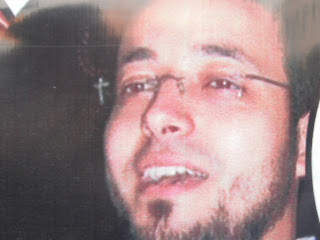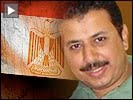Here's the link to this video: http://www.youtube.com/watch?v=B8ZvmALAyIo
Here some more photos I took of young people I saw today who were spending the day painting. They invited us to join them in the painting, but we were on our way to a brunch hosted by a faculty member at the university.
I've heard many stories about young people around the city helping to clean and paint 'their Egypt'. A couple teachers at Cameron's school talked about how kids aged 12-16 came by their apartment building seeking contributions for paint. One of the teachers told a story about a child who saw someone litter and went up to them to say "Two pounds please". This was designated as the fee for littering, with all fees going toward cleanup efforts and painting. The person who had littered did pay the young person the 2 pounds.
I was walking down the sidewalk a couple days ago when I saw a man walking a large dog. The dog did it's business on the sidewalk and the man didn't pick up after the dog. The passenger in the car going by called out to the man with the dog saying he should clean up and shaking his finger at the man when he didn't. The driver of the car also honked at the man with the dog motioning that he should clean up.
This self-policing to try to keep Egypt clean is completely new and seems to be quite widespread.
____________________________
Things also seem to be getting back to normal in some respects with people enjoying ordinary pleasures like a walk in the park. Here's a short video of a family or friends playing some type of handkerchief game in the park:
Here's a photos of some of the many newly painted curbs.
Many of the grassy areas are looking much cleaner.
There is a feeling of patriotism seen in many ways, such as tree painting.
This car has the Egyptian flag painted on it.
_______________________________
On a different note, I was at a breakfast for students in our graduate program at the university when I learned that the protest the night before in Tahrir Square had been broken up by force in the middle of the night. Here is a New York Times article about what happened.
The Egyptian Gazette published an article later saying that the Egyptian Army has apologized for actions taken the night before to remove protesters from the Square. Here is a link to an article about this:






































